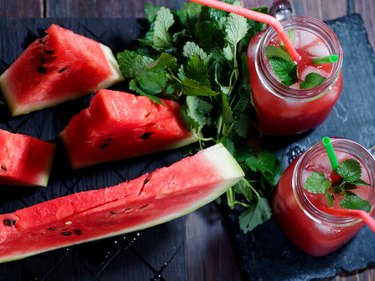
Eating any kind of melon at the peak of ripeness can be akin to a religious experience. As the juice drips down your chin, you can actually hear the angels sing. Even better — eating melons on a diet is not a sin and it can even be a blessing when you're trying to give up sweets.
Tip
Melons are the perfect low-calorie replacement for sugary sweets, and they can help you shed pounds.
Video of the Day
When you're trying to lose weight, the main goal is to keep your calorie intake below your calorie expenditure. When you sustain this for a period of time, your body begins to burn fat for fuel, and your fat stores shrink. In reality it's a little more complex, but that's the short version.
Video of the Day
The second most important goal is to continue to meet your nutrient needs, even though you have reduced your calorie intake. That means choosing foods that have a high nutrient-to-calorie ratio, such as most fresh fruits and vegetables, whole grains and lean meats.
You're most likely going to have to make some sacrifices. Junk foods, processed foods, fried and fatty foods, and fast foods are diet-busters, high in calories but low in nutrients. Cookies, candy and other sweets and desserts are also off the table. Just one-half cup of chocolate ice cream has 150 calories, according to the USDA; a brownie has 225 calories. That's not going to fit in to your reduced-calorie diet on a regular basis.
Low-Calorie Sweet-Tooth Saver
Enter ripe, juicy melons. Low in calories and high in nutrients, you can indulge in watermelon, cantaloupe and honeydew melons whenever your sweet-tooth screams out.
Per cup, the USDA reports that a honeydew's calories are 64, cantaloupe calories come in somewhat less at 54, and watermelon calories are the least at 46 — although these differences are still quite slight.
A daily diet including 1,200 to 1,500 calories is appropriate for most women to lose weight, according to the National Institutes of Health, and one cup of cantaloupe would comprise only 3.5 to 4.5 percent of that total. You can't say that for a brownie, which would make up nearly 20 percent of a 1,200-calorie diet.
Melons are high in carbohydrates, but the carbs in melons won't hinder weight loss when consumed in moderation. Natural sugars are most of the carbohydrate content in melons, but there is also dietary fiber.
Fiber is the tough part of plant cell walls that the body can't digest. Not only does fiber help normalize bowel function, but it also helps temper the effects of natural sugars in fruit on your body's blood sugar. Per cup, honeydew melon and cantaloupe provide 1.4 grams of fiber, and watermelon has .6 grams of fiber.
Fiber is a highly satiating nutrient. It slows stomach emptying, which can help you feel full for longer. It also causes stomach distension, which can delay the release of an appetite-stimulation hormone called ghrelin, according to a review article in the Journal of Nutrition and Metabolism in January 2019.
Melons are made up of 90 percent water, reports the USDA. Like fiber, water also helps fill up your stomach and can have an appetite-suppressing effect. Filling up on melon is both hydrating and less caloric than filling up on many other foods.
Including Melons in Your Diet
Melons are also a rich source of many vitamins and minerals, such as vitamin C, potassium, niacin and vitamin A, so you can feel good about eating them in place of less nutritious, higher calorie foods. But, as with any food, it's important to avoid overdoing it. If you eat too much melon, you risk getting too little of other nutrients, such as protein and calcium, of which melons aren't a good source.
Stick to one or two servings a day, and aim to include a wide variety of fruits in your diet. Fresh raspberries and blueberries are also low-calorie, nutrient-rich fruits that are especially high in fiber. Try mixing melons and berries in a fruit salad that you can have for breakfast or take on the go for a mid-afternoon snack.
Melons also go great in summery salads. Try chunks of watermelon with basil and a little feta cheese drizzled with balsamic vinegar, or a mix of spring greens, chopped mint, pumpkin seeds, melon chunks, chopped red onion and a light olive oil and vinegar dressing.
- Journal of the Academy of Nutrition and Dietetics: "Time to Correctly Predict the Amount of Weight Loss with Dieting"
- USDA: "Basic Report: 19270, Ice creams, Chocolate"
- USDA: "Basic Report: 18151, Cookies, Brownies, Commercially Prepared"
- USDA: "Basic Report: 09184, Melons, Honeydew, Raw"
- USDA: "Basic Report: 09181, Melons, Cantaloupe, Raw"
- USDA: "Basic Report: 09326, Watermelon, Raw"
- National Institutes of Health: "Healthy Eating Plan"
- Mayo Clinic: "Dietary Fiber: Essential for a Healthy Diet"
- Journal of Nutrition and Metabolism: "The Role of Fiber in Energy Balance"
- Perspectives on Psychological Science: "Reducing Calorie Intake May Not Help You Lose Body Weight"